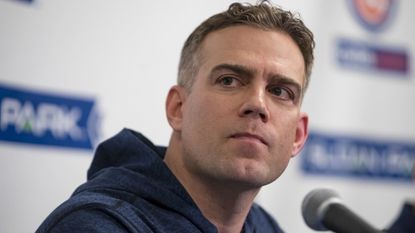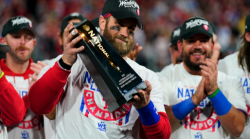Theo Epstein acknowledges racial issues
In a call with reporters on Monday, Chicago Cubs president of baseball operations Theo Epstein had some remarkably honest words to say about the organization and himself as he pledged his support for Black Lives Matter.
“I’d like to start just by offering my condolences to the families of George Floyd, Breonna Taylor, Ahmaud Arbery and the countless victims who keep losing their lives to racist violence in this country year after year, decade after decade, century after century,” Epstein told reporters on the conference call, via ESPN. “I join my colleagues at the Cubs in standing up in support of the Black Lives Matter movement and the protesters who are doing their best to make this a real inflection point in our history. At this moment in time, silence is complicity, and it’s important that all of our voices are heard.”
Many players, coaches and executives across various professional sports leagues have come out to speak out against racism since the tragic murder of George Floyd on May 25th. Protests continue to take place around the globe in support of Black Lives Matter and to put an end to systemic racism.
Epstein vowed that his club would act immediately, suggesting that the team will form a diversity committee in order to “set better standards”.
“It can be hard, and it can be painful to look at ourselves, but when the problem is systemic, we all have to admit that we’re all part of the problem, and we all have to do better to become part of the solution,” Epstein said. “And as a white person who’s had a lot of advantages and a lot of privilege, I can’t begin to walk in the shoes of a black person in this country or a black player in Major League Baseball.
“I think I can also look inward, too. I think that’s another step that we all have to take in society as well as in the game is being able to look hard at ourselves.”
Epstein has been with the Chicago Cubs since October 2011 and helped lead them to their first World Series since 1908 in 2016 when they beat the Cleveland Indians in seven games. The 46-year-old made it clear though that there were bigger issues to address than just the success of his baseball team, identifying some rather concerning trends.
“It’s alarming, just the trend of black players in the big leagues over the last several decades that we need to address and address it at the youth level as well,” he said. “Major League [Baseball] has done a ton of outreach and has really invested in a lot of diversity programs, but it’s a complicated problem with no one easy solution.
“To the extent that the clubhouses are not a welcome enough place for black players, we should all be asking ourselves what we can do to fix that problem. To the extent that we don’t have enough black general managers or black managers, I think we all need to look at ourselves, at our own practices.
“If there’s one thing we’ve learned with systemic racism in general, the system doesn’t fix itself. It’s on each of us to take action to stand up and make some changes.”
It will be interesting to monitor changes or policies that the league and clubs implement going forward, but it is a positive sign that club executives are willing to discuss the issues affecting the game.
Major League Baseball has yet to kickoff their 2020 season due to the COVID-19 pandemic, with the players and owners still in disagreement as to what a restructured season will look like and how much the players will be paid. As time continues to slip away, the season becomes increasingly in jeopardy of happening at all.







